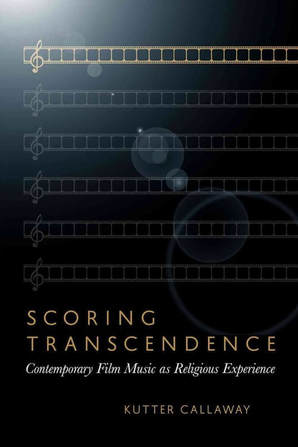
By Kutter Calloway
Baylor University Press, 2013
As the title suggests, Scoring Transcendence by Kutter Calloway is concerned with parsing the theological implications of film music. Callaway’s thesis is premised on the notion that the divine Spirit is present and active in all human activities, including those activities outside the bounds of traditional religion. His goal in writing is to help readers become aware of the Spirit’s activity, particularly in our film experiences.[1]
Callaway begins by showing that films, particularly film scores, have the potential to provide first-order spiritual encounters with the Transcendent. Using Pixar’s short library of animated films, his first set of examples will be accessible to most readers. Moreover, by starting with a list of films many would initially dismiss as “children’s movies,” Callaway is able to make a plausible case with more clarity and less effort than if he had begun with less accessible films like “The Tree of Life.”[2]
Methodologically, Callaway engages in second order theological reflection by analyzing film scores, while first-order theological experiences are drawn from personal interviews with movie-goers and from his own encounters with the divine in film.[3] This is essential to his argument that “’meaning’ emerges through the interplay between both the film’s form and the film’s reception.”[4] In other
words, meaning cannot be solely deduced through the process of analytic logic from a distant observer, viewers engage a range of inherent meanings through the totality of their experiences. A two way hermeneutical movement occurs between our life experiences and our film experiences, so that what we experience in life affects how we watch films, yet our experiences watching films also profoundly impact the way we live our lives.[5]
Cutter argues that the hermeneutic by which we interpret our film experience arises not only from the images we see on the screen, or even from the plot. The music functions to create a surplus of additional meaning over and above the images and stories.[6] Calloway then uses specific examples from an array of films to show how a single musical theme or a major or minor key can change the way viewers interact with a story or scene.[7]
Critical Dialogue
The above raises a question: Does God reveal Godself through anything and everything? Callaway wants us to believe that the “inspiriting presence” of the divine is permeating creation with redemptive activity. The transcendent power of film scores has little to do with second order theology or the knowledge of God, it has rather to do with the human/divine encounter in what traditionally has been called “general revelation.” [8] For a Protestant theologian like Callaway, this naturally leads to a second question: does this focus on the divine Spirit promote a low Christology?
Traditionally, Protestant theology has been concerned with a high Christology, insisting from passages such as Colossians 1:15-23 that all things were “created for him (Jesus)… that in everything he might be preeminent” (ESV). By emphasizing general revelation and the work of the Spirit in all of humanity, does Callaway risk missing out on the core of the Christian message? Callaway’s research on nonreligious viewer reviewing websites reveals that many people have experiences with the transcendent through watching film. The Spirit’s indwelling presence frees us “to move beyond pure critique, celebrating and affirming the ways in which cultural products like film reflect the presence and movement of God in the world.”[9]
Thus, Scoring Transcendence provides readers with the tools to deepen their understanding of the film watching experience, by viewing it theologically, as something greater than cognitive-emotional reaction, as divine encounter.
[1] Kutter Callaway, Scoring Transcendence: Contemporary Film Music as Religious Experience (Waco: Baylor University Press, 2013), 4.
[2] Callaway himself told me this was unintentional, a recommendation from the publisher. Originally, the Pixar chapter was the book’s conclusion.
[3] Callaway, 50.
[4] Ibid, 109.
[5] Ibid, 131.
[6] Ibid, 106.
[7] Ibid, 119.
[8] Ibid, 155.
[9] Ibid, 191.
 RSS Feed
RSS Feed
